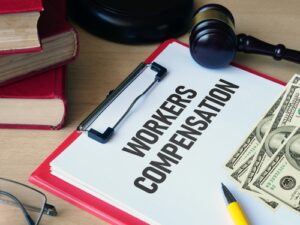Workers’ Comp Claims for Restaurant Staff
Workers’ Comp Claims for Restaurant Staff
The restaurant industry is known for its fast-paced environment, long hours, and physically demanding work. These factors bring inherent risks and potential injuries that can affect employees’ well-being and livelihoods. When accidents occur in the workplace, restaurant staff may face medical bills, lost income, and uncertainty about their future. This is where workers’ compensation claims come into play, providing a safety net for employees who have suffered an injury on the job.
Here, a Newport Beach workers’ compensation lawyer will explore the ins and outs of workers’ compensation claims specifically tailored to restaurant staff. We’ll delve into common workplace injuries in the food service industry, the process of filing a claim, potential challenges that may arise, and the role of a workers’ compensation lawyer in ensuring fair treatment and adequate compensation for injured employees.
Schedule a Free Initial Consultation Today!
Understanding Workers’ Compensation in the Restaurant Industry
Workers’ compensation is insurance that provides medical care and financial benefits to employees who suffer work-related illnesses or injuries. Understanding the basics of workers’ compensation is particularly important for restaurant staff due to the unique risks associated with their work environment.
In the food service industry, employees face a variety of potential hazards on a daily basis. The risks are numerous and ever-present, from slips and falls on wet floors to burns from hot cooking surfaces. Additionally, repetitive motion injuries from tasks like chopping vegetables or carrying heavy trays can develop over time, leading to chronic pain and disability if left unaddressed.
on a daily basis. The risks are numerous and ever-present, from slips and falls on wet floors to burns from hot cooking surfaces. Additionally, repetitive motion injuries from tasks like chopping vegetables or carrying heavy trays can develop over time, leading to chronic pain and disability if left unaddressed.
Workers’ compensation laws vary by state, but generally, they require employers to carry insurance covering medical expenses, lost income, and rehabilitation costs for employees who suffered an injury on the job. These laws also typically protect employers from lawsuits related to workplace injuries, creating a mutually beneficial arrangement for both parties.
The restaurant industry presents a unique set of challenges when it comes to workers’ compensation. The fast-paced nature of the work, combined with the physical demands placed on employees, creates an environment where injuries are more likely to occur. Kitchen staff, for example, work with sharp knives, hot stoves, and slippery floors, increasing their risk of cuts, burns, and falls. Servers and bartenders often carry heavy trays and navigate crowded dining rooms, putting them at risk for strains, sprains, and other musculoskeletal injuries.
Also, the long hours and high-stress environment common in many restaurants can contribute to mental health issues and stress-related physical ailments. While these conditions may be less visible than a cut or burn, they can be just as debilitating and are often covered under workers’ compensation laws.
One key benefit of workers’ compensation for restaurant employees is that it provides coverage regardless of fault. This means that even if an employee’s own negligence contributed to their injury, they are still eligible for benefits. This no-fault system helps ensure that injured workers receive the care they need without having to prove that their employer was at fault for the accident.
However, it’s important to note that workers’ compensation is not always a simple process. Claims can be denied for various reasons, such as disputes over whether an injury is work-related or disagreements about the extent of an employee’s disability. This is where having a clear understanding of workers’ compensation rights and procedures becomes invaluable for restaurant staff.
For employers in the restaurant industry, maintaining adequate workers’ compensation insurance is not just a legal requirement but also a sound business practice. It helps protect the business from potentially costly lawsuits and demonstrates a commitment to employee safety and well-being. Additionally, a robust workers’ compensation program can improve employee retention and morale, as staff members feel more secure knowing they have protection in case of workplace injuries.
It’s also worth noting that workers’ compensation coverage extends beyond just immediate medical care. It can include ongoing treatment, physical therapy, and even vocational rehabilitation if an employee is unable to return to their previous position due to their injury. This comprehensive approach is designed to support injured workers throughout their recovery and help them return to gainful employment as soon as possible.
In the restaurant industry, where many employees rely on tips as a significant portion of their income, workers’ compensation can play a particularly important role in financial stability following an injury. Lost income benefits typically consider an employee’s total earnings, including tips, ensuring injured workers are not left financially vulnerable during their recovery period.
Understanding the nuances of workers’ compensation is also important for restaurant managers and supervisors. They play a key role in creating a safe work environment, reporting injuries promptly, and facilitating the claims process when accidents do occur. By fostering a culture of safety and open communication about workplace hazards, managers can help reduce the likelihood of injuries and ensure that employees feel comfortable reporting incidents when they happen.
Common Workplace Injuries in Restaurants
Restaurant staff face a unique set of risks in their work environment. Understanding these common injuries can help employees recognize potential hazards and take appropriate action if an accident occurs.
Some of the most frequent workplace injuries in the food service industry include slips, trips, and falls, resulting from wet or greasy floors, cluttered walkways, and uneven surfaces. These incidents often lead to sprains, strains, fractures, or head injuries, particularly in busy kitchens and dining areas where spills may occur frequently.
Burns and scalds are another significant concern, as working with hot stoves, ovens, grills, and fryers puts restaurant staff at risk of severe injuries. Scalding from hot liquids, steam, or splashing oil is common in food preparation areas.
Cuts and lacerations present another hazard, with sharp knives, broken glassware, and food processing equipment posing serious risks. These injuries can range from minor nicks to deep wounds requiring stitches or even surgical intervention.
Repetitive strain injuries are a less obvious but equally important concern. Tasks involving repetitive motions, such as chopping vegetables, washing dishes, or carrying heavy trays, can lead to conditions like carpal tunnel syndrome, tendonitis, or back pain over time.
Musculoskeletal disorders are also prevalent, with lifting heavy objects, bending, reaching, and standing for long periods potentially resulting in injuries to the back, neck, shoulders, and knees. These injuries may develop gradually or occur suddenly due to overexertion.
Eye injuries can occur from splashing liquids, flying food particles, or cleaning chemicals, particularly if proper protective equipment is not used. Chemical exposure is another risk, as restaurant staff may come into contact with various cleaning products, sanitizers, and other chemicals that can cause skin irritation, respiratory issues, or allergic reactions.
Lastly, the high-pressure environment of a restaurant can contribute to stress-related illnesses, including anxiety and depression, which may be covered under workers’ compensation in some jurisdictions.
The Process of Filing a Workers’ Compensation Claim
When a restaurant employee suffers an injury on the job, knowing the proper steps to take can significantly affect the outcome of their workers’ compensation claim. The process typically involves several key stages, including reporting the injury to a supervisor or manager as soon as possible. Many states have strict deadlines for reporting workplace injuries, and failing to do so promptly can jeopardize the claim. It’s advisable to provide written notice of the injury, including details about how, when, and where it occurred.
After reporting the injury, the employee should seek appropriate medical care. Sometimes, the employer may have designated healthcare providers for work-related injuries. It’s important to inform the medical professional that the injury is work-related and to follow their treatment recommendations carefully.
Once notified of the injury, the employer is typically required to provide the employee with the necessary forms to file a workers’ compensation claim. The employer should also report the injury to their workers’ compensation insurance carrier.
provide the employee with the necessary forms to file a workers’ compensation claim. The employer should also report the injury to their workers’ compensation insurance carrier.
The employee must complete and submit the official workers’ compensation claim form. This form usually requires detailed information about the injury, including the incident’s date, time, location, and circumstances. It’s important to be thorough and accurate when filling out this form, as any discrepancies or omissions can potentially delay or complicate the claim process.
After the claim is filed, the workers’ compensation insurance company will review the information and determine whether to accept or deny the claim. If accepted, the injured employee will begin receiving benefits, which may include coverage for medical expenses and a portion of their lost income.
Throughout this process, it’s important for the injured employee to keep detailed records of all medical treatments, correspondence with their employer and the insurance company, and any other relevant information related to their injury and recovery.
Challenges in Workers’ Compensation Claims for Restaurant Staff
While the workers’ compensation system is designed to support injured employees, restaurant staff may face unique challenges when filing and pursuing their claims. One common issue is the prevalence of part-time or seasonal work in the industry, which can complicate the calculation of lost income and benefits.
employees, restaurant staff may face unique challenges when filing and pursuing their claims. One common issue is the prevalence of part-time or seasonal work in the industry, which can complicate the calculation of lost income and benefits.
Another challenge is the high turnover rate in many restaurants, which may lead to disputes over whether an injury is truly work-related, especially if the incident is reported after an employee has left their position. Additionally, the fast-paced nature of restaurant work can sometimes result in delayed reporting of injuries, particularly those that develop gradually over time.
Pre-existing conditions can also complicate workers’ compensation claims for restaurant staff. For example, an employee with a history of back problems may face scrutiny if they file a claim for a work-related back injury. In these cases, it’s important to demonstrate how the work environment exacerbated or aggravated the pre-existing condition.
Some restaurant employees may also face pressure from employers to not report injuries or return to work before fully recovering. This can be particularly problematic in smaller establishments where losing a key employee can significantly impact operations.
Language barriers and lack of familiarity with workers’ compensation laws can present additional obstacles for some restaurant workers, particularly in diverse urban areas or in establishments with a high proportion of immigrant workers.
The Role of a Workers’ Compensation Lawyer
Given the potential difficulties and challenges involved in filing a workers’ compensation claim, many injured restaurant employees choose to seek the assistance of a workers’ compensation lawyer in Newport Beach. A workers’ compensation attorney can provide valuable guidance throughout the claims process, helping to ensure that injured workers receive the full benefits they’re entitled to under the law.
A workers’ compensation lawyer can assist with various aspects of the claim, including gathering and organizing medical evidence, negotiating with insurance companies, and representing the injured worker in hearings or appeals if necessary. A Newport Beach workers’ compensation attorney can also help interpret legal documents and explain the injured worker’s rights and responsibilities under state workers’ compensation laws.
A workers’ compensation lawyer can be instrumental in addressing industry-specific challenges for restaurant staff in particular. An attorney can help calculate appropriate benefits for workers with variable schedules or multiple employers, advocate for necessary accommodations or job modifications during recovery, and challenge claim denials based on pre-existing conditions or delayed reporting.
Also, a workers’ compensation attorney in Newport Beach can provide support if an employer retaliates against an employee for filing a claim. While such retaliation is illegal, it unfortunately still occurs in some cases, and having legal representation can help protect the injured worker’s rights and employment status.
In cases where a third party (someone other than the employer) may be partially responsible for the injury – for example, if a delivery person suffers an injury due to faulty equipment provided by an outside vendor – a Newport Beach workers’ compensation lawyer can explore the possibility of additional compensation through a personal injury lawsuit.
It’s important to note that most workers’ compensation attorneys work on a contingency fee basis, meaning they only get paid if the injured worker receives benefits. This can make legal representation more accessible for restaurant staff concerned about upfront costs.
Contact a Workers’ Compensation Lawyer Today to Discuss Your Case
If you’re a restaurant worker who has suffered an injury on the job, don’t go through the workers’ compensation process alone. Contact a workers’ compensation lawyer in Newport Beach today to discuss your case and learn about your rights.
With the right support and guidance, you can focus on your recovery while ensuring you receive the full benefits you’re entitled to under the law. Don’t let a workplace injury derail your career or financial stability – take the first step towards protecting your future by contacting a workers’ compensation lawyer now.


